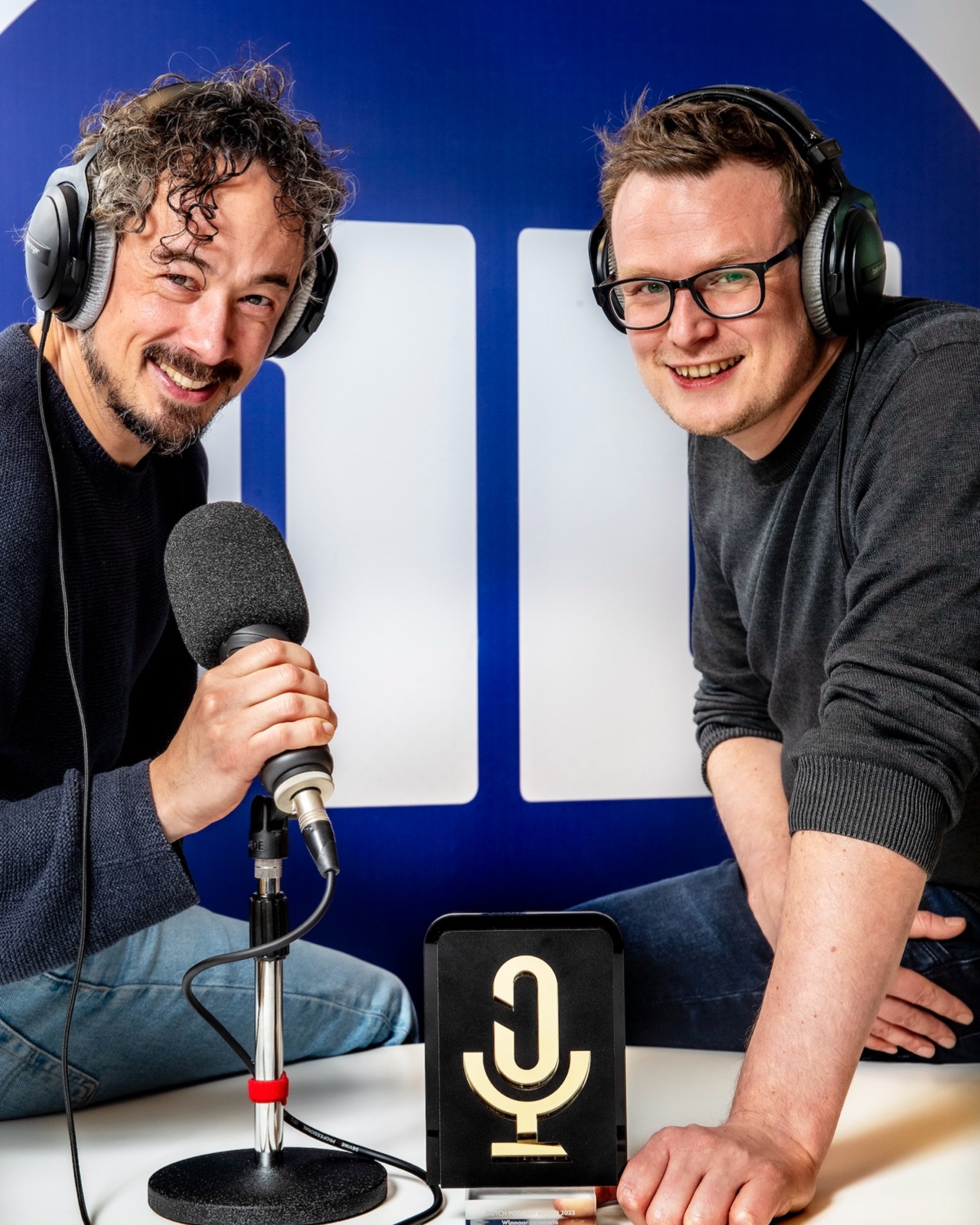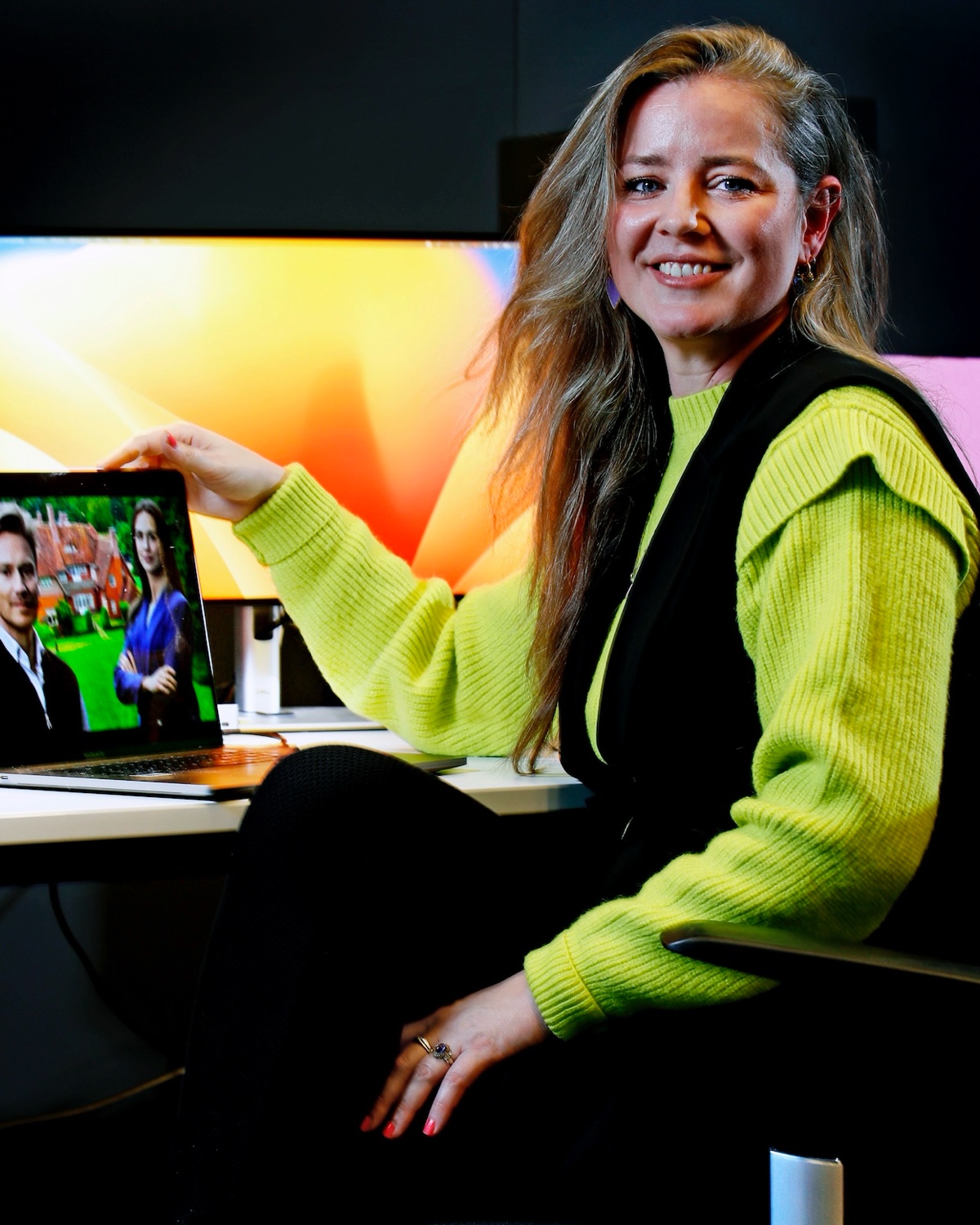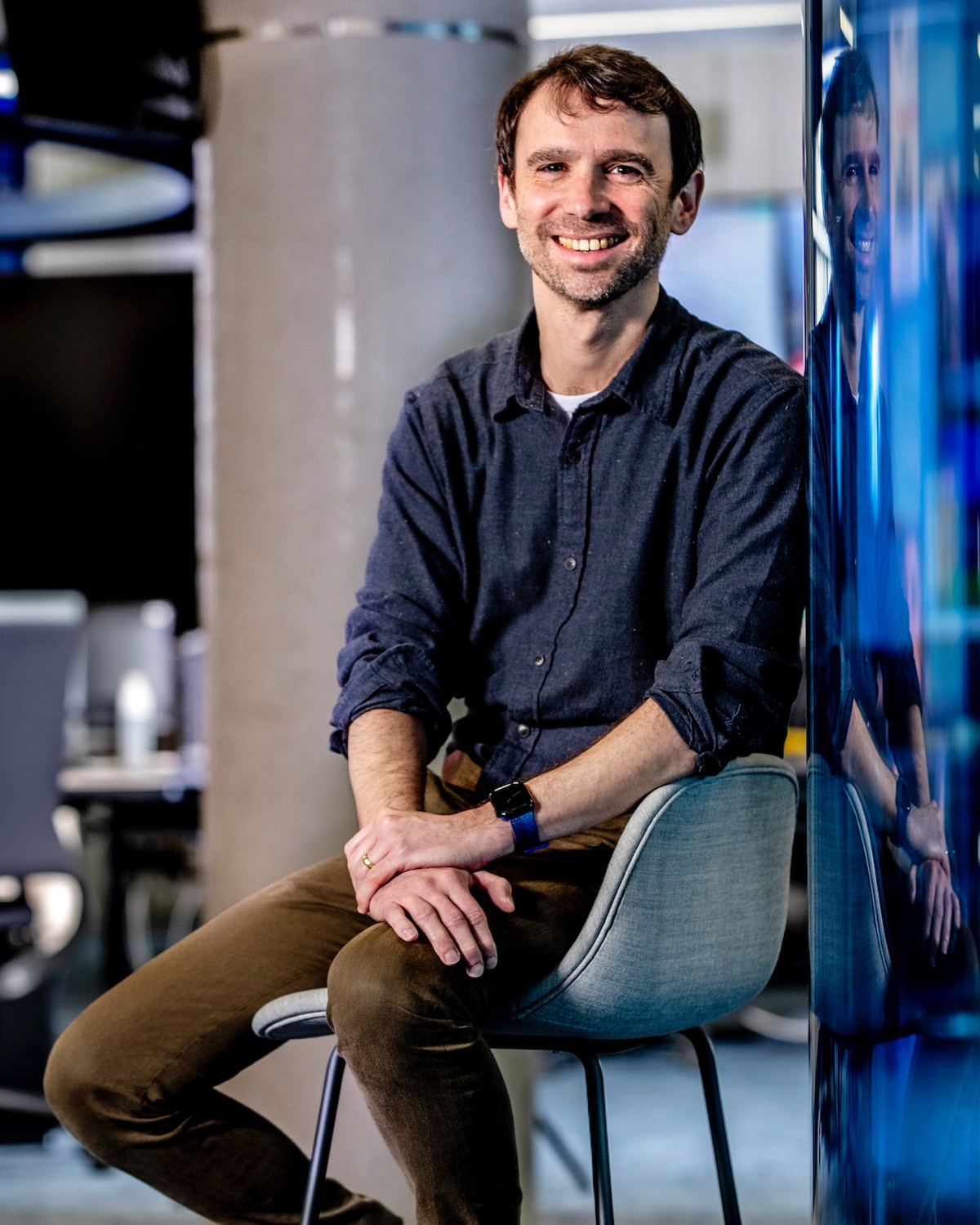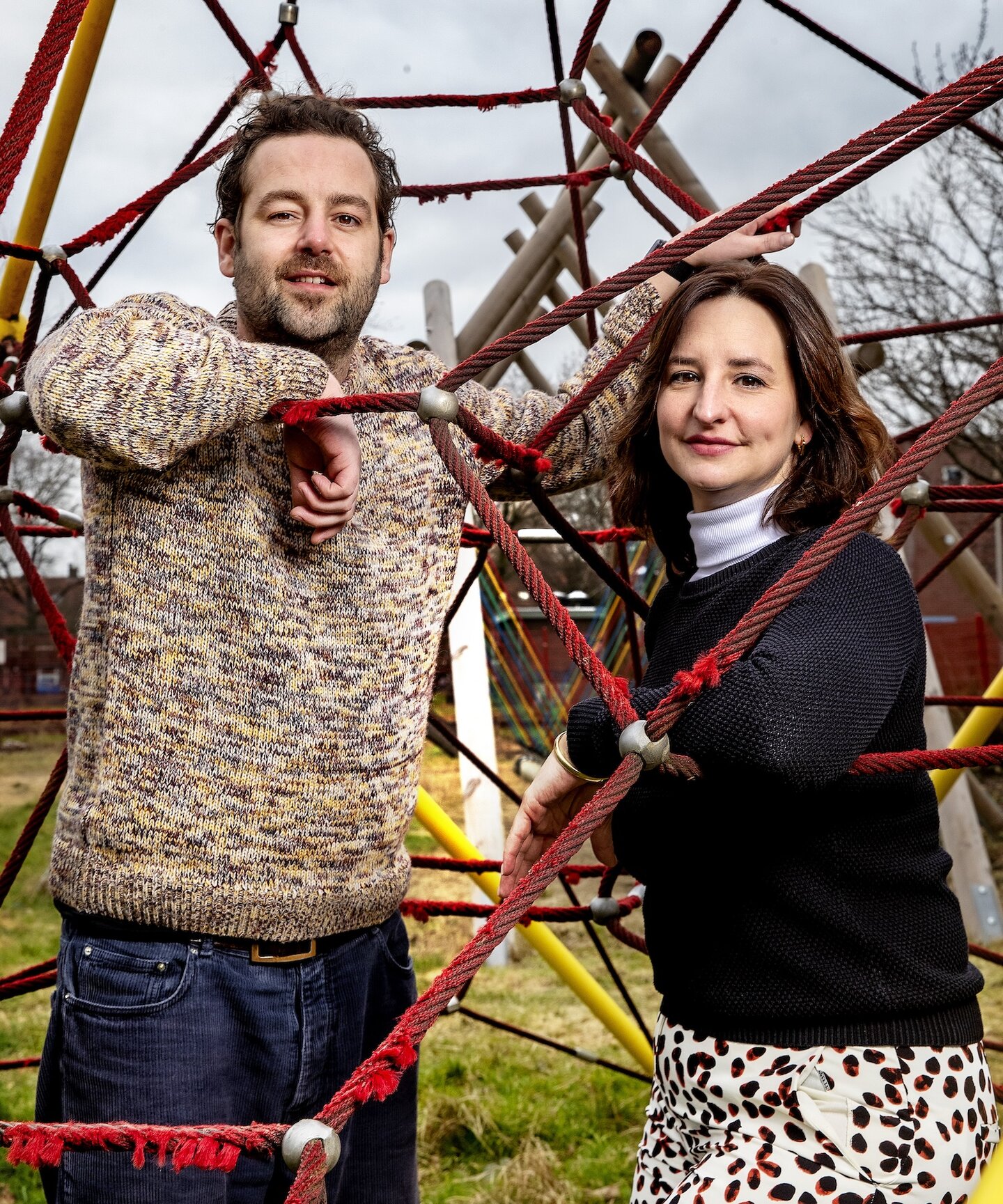NEWS MEDIA
Journalistic highlights of
2023
Several DPG Media creators produced journalistic content last year that moved our readers, listeners and viewers. Read the stories behind these productions, as told by the journalists themselves.

JORIS PETERS AND FRANK BRINKHUIS (NU.NL)
“The podcast was going to happen, which was a victory in itself”
The Secret of Majorca is a podcast that revolves around Carlo Heuvelman, who died following an assault. Joris Peters investigated his death and made the podcast with David Achter de Molen of Het Podcast Kantoor and final editor Frank Brinkhuis.
Read more
Saskia Troccoli (AD Play)
The Philips Dynasty:
Play’s standout production
“How could a man like that have such an impact on an entire community?” Frits Philips’ great-granddaughter, Eline Hintzen, wondered. Together with the journalist Sander Schimmelpenninck, she was the face of the documentary The Philips Dynasty, which traced the legacy of ‘Mr Frits’.
Read more


Jonas Muylaert (News City)
How Flemish car inspection companies failed their own inspection
Getting annoyed during a car inspection has become something of a national pastime in Flanders. “You’re waiting there for hours, only to
be told that your headlight isn’t properly aligned. And then they tell you to come back later. Such a joy!” says Jonas Muylaert, head of News City’s Research Cell.
Read more
Cathy Galle en Dimitri Thijskens (De Morgen)
“some children get a head start”
Can you still achieve success through hard work alone, or do you need a silver spoon? What if it feels like everyone around you got a head start in life? How deep is the gap between the haves and the have-nots in Flanders? And how can we close it? These were the questions Cathy Galle and Dimitri Thijskens, journalists at De Morgen, sought to answer.
Read more


Erik Verwiel, Pieter Sabel, Titus Knegtel, Willem Feenstra en Xander van Uffelen (de Volkskrant)
“You have to see the footage to believe it”
Saturday morning, 7 October 2023. Thousands of revellers are dancing away their troubles at the Supernova festival in Israel’s Negev desert,
five kilometres from the Gaza border. As the sun begins to rise, panic breaks out. Out of nowhere, the festivalgoers are attacked by terrorists from Gaza who arrive in pick-up trucks and empty their Kalashnikovs into the crowd.
Read more
Petra Vissers, daan Hofstee (Trouw)
“Surely this can’t actually be true, right?”
For the narrative podcast De gestolen kinderen (The Stolen Children), Petra Vissers immersed herself in the bizarre world of international adoption for almost two years. “Our research began when we learned about the story of Mirjam Hunze, who was adopted from Chile in 1972,” Vissers says. “Mirjam grew up in Lunteren and started looking for her biological family when she was a teenager. After a 20-year search, she was finally able to track them down thanks to a Dutch nun who ran a children’s home in Chile. But what initially seemed to have all the makings of a family reunion ended in tragedy.”
Read more

Joris Peters & Frank Brinkhuis (NU.nl)
“The podcast was going to happen, which was a victory in itself”
The Secret of Majorca is a podcast that revolves around Carlo Heuvelman, who died following an assault. Joris Peters investigated his death and made the podcast with David Achter de Molen of Het Podcast Kantoor and final editor Frank Brinkhuis.
“One thing I’ll never forget about the process of making The Secret of Majorca is the moment we almost had to give up,” Peters says. “The people we wanted to interview dropped out or turned down our invitation. In a last-ditch effort, we decided to travel to Majorca one more time. A bartender we wanted to talk to there, Arie, was so impressed by our
dedication that he changed his mind. After we finished the interview, I watched him walk away down the corridor of the hotel, afraid he would turn around and tell us we couldn’t use the recording.”
“But he didn’t, so we had enough material for our first two episodes. That meant that the podcast was actually going to happen, which was a victory in itself. No one expected that it would attract so many listeners, or that it would go on to win the prize for best journalistic podcast at the Dutch Podcast Awards. It’s great to receive recognition, but nothing beats the adventure we experienced.”
Listen to the podcast
Saskia Troccoli (AD Play)
The Philips Dynasty:
Play’s standout production
“How could a man like that have such an impact on an entire community?” Frits Philips’ great-granddaughter, Eline Hintzen, wondered. Together with the journalist Sander Schimmelpenninck, she was the face of the documentary The Philips Dynasty, which traced the legacy of ‘Mr Frits’.
“Eline and Sander had great chemistry and looked good together on screen, which didn’t hurt,” says Saskia Troccoli. As commissioning editor, she was one of the people working behind the scenes on the seven-part video series.
The Philips Dynasty more or less fell into her lap. “Daan Willekens of the production company D2D Media suddenly came to us with this story. It was the first time I’d been offered a script that had all the right ingredients: a timeless and powerful journalistic story with regional roots and national appeal.” That made it an ideal fit for AD and DPG Media’s regional titles. It became the most viewed series on Play, the video platform of AD and the regional titles. “We’re at
well over a million views in total.”
“It’s a family story,” says Troccoli. “But it’s also a personal story, told by family members. A lot of people know someone who worked at Philips. After all, Philips is a national institution in the Netherlands, but one with a regional character.”
Troccoli is already working on new ideas. “There are really good stories to be found in DPG Media’s back catalogue,” she insists. “There are hidden gems, especially in the region – we’ve got opportunities other streaming services would envy. So I see potential for a lot more docuseries like this in the future.”
Watch the documentary
Jonas Muylaert (News City)
How Flemish car inspection companies failed their own inspection
Getting annoyed during a car inspection has become something of a national pastime in Flanders. “You’re waiting there for hours, only to be told that your headlight isn’t properly aligned. And then they tell you to come back later. Such a joy!” says Jonas Muylaert, head of News City’s Research Cell. “No one believes that the inspection companies are private businesses – it’s so obvious that they’re government agencies. Because when you go to a private company, you expect a minimum level of customer service, innovation and flexibility. The crazy thing is that these companies actually market themselves as boring, stuffy government agencies, like it’s a deliberate strategy. But why?”
That question became the genesis of his research. “For once, I wanted to turn the tables on them – I wanted to inspect the inspection companies. Who’s running these companies that get to inspect millions of vehicles every year on behalf of our government, and that get paid handsomely for their services? I was in for a long and difficult investigation, because no one in this country seems to know how things work. My requests for more information on certain figures, legislation and control mechanisms were usually met with a deep sigh: ‘We don’t really have a clear view of the situation ourselves, sir’.”
“After three months, countless Excel spreadsheets and many more deep sighs, I was finally able to demonstrate that the inspection companies had been guaranteed lifelong seats on the government gravy train for decades. No one gets in their way, they basically write the laws themselves and there’s barely any oversight. For years, they’ve been overcharging customers and underpaying the government. Even the Minister and her government agencies weren’t aware of that. The investigation galvanised a push for policy liberalisation and, hopefully, more customer-friendly service.”
Check out the research
Cathy Galle en Dimitri Thijskens De Morgen
“some children get a head start”
Can you still achieve success through hard work alone, or do you need a silver spoon? What if it feels like everyone around you got a head start in life? How deep is the gap between the haves and the have-nots in Flanders? And how can we close it? These were the questions Cathy Galle and Dimitri Thijskens, journalists at De Morgen, sought to answer.
Cathy Galle still remembers that the sixth-formers of the Ostend secondary school she visited for the series The Gap were genuinely angry when they were subjected to a social experiment. “We asked them to play a running game that seemed innocent enough at first,” she says. “Except for the fact that we asked them a few questions before the starting shot.
Were your parents born in this country? Did they go to university? Can your family make ends meet every month? Every time someone answered ‘yes’, they were allowed to take a few steps forward. And that makes a big difference in race. The kids were very upset afterwards, which also genuinely affected us emotionally – even though it was exactly what we wanted to achieve.”
Because the game, Galle explains, is the perfect metaphor for what things are like in the real world. “There too, some children get a head start. And it’s that starting position that largely determines what the rest of their lives will look like, and how big the social gap in our society will be. That’s what we wanted to demonstrate with this series, which is packed with data, interviews and background. Jan Straetmans and Bart Hebben, who specialise in infographics, also helped us translate the results of our research into a game and some great online tools that allow readers to find out how big the gap is in their municipality.”
Check out the research
Erik Verwiel, Pieter Sabel, Titus Knegtel, Willem Feenstra en Xander van Uffelen (de Volkskrant)
“You have to see the footage to believe it”
Saturday morning, 7 October 2023. Thousands of revellers are dancing away their troubles at the Supernova festival in Israel’s Negev desert, five kilometres from the Gaza border. As the sun begins to rise, panic breaks out. Out of nowhere, the festivalgoers are attacked by terrorists from Gaza who arrive in pick-up trucks and empty their Kalashnikovs into the crowd.
Our newsroom quickly realised that this event symbolised the bigger story. It showed how Israel, a country long thought to be invulnerable, was overrun by Hamas fighters. It also showed the terrorists’ ruthlessness, and how a country was plunged into chaos within a matter of hours. The Open Source Intelligence (OSINT) team at de Volkskrant – Erik Verwiel, Pieter Sabel, Titus Knegtel, Willem Feenstra and Xander van Uffelen – decided to publish a reconstruction as soon as possible.
We collected numerous videos that appeared on social media in the hours and days after the attack, we scoured international media for eyewitness accounts, and we personally spoke to two festivalgoers, who told us the story of their escape across the desert. We also studied maps, satellite images and flyers of the festival, and we approached DJs who were in the middle of their set when the shooting started.
When we put all these puzzle pieces together, they told the story of a news event so surreal you have to see the footage to believe it.”
Read the reconstruction
Petra Vissers, daan Hofstee (Trouw)
“Surely this can’t actually be true, right?”
For the narrative podcast De gestolen kinderen (The Stolen Children), Petra Vissers immersed herself in the bizarre world of international adoption for almost two years. “Our research began when we learned about the story of Mirjam Hunze, who was adopted from Chile in 1972,” Vissers says. “Mirjam grew up in Lunteren and started looking for her biological family when she was a teenager. After a 20-year search, she was finally able to track them down thanks to a Dutch nun who ran a children’s home in Chile. But what initially seemed to have all the makings of a family reunion ended in tragedy.”
That tragedy is the first story told on the podcast. “But our research revealed so much more than just Mirjam’s story. So many times I thought: ‘Surely this can’t actually be true, right?’ Almost everyone I interviewed had a unique story or personality. There was also a lot more lying and twisting than I could have imagined beforehand.”
Vissers’ trip to Chile in early 2023 would prove to be her most memorable experience. “I often think back to the remarkable encounters my co-producer, Daan Hofstee, and I had there. Like with Miguel, who was given up for adoption as a child but moved back to Chile after reuniting with his biological family. He’d been living there with his sister for a year, even though he spoke very little Spanish. It was very touching to see how he was willing to accept living conditions that were far from ideal, just because he had this incredibly strong desire to be with his mother and sister.”
Listen to the podcast